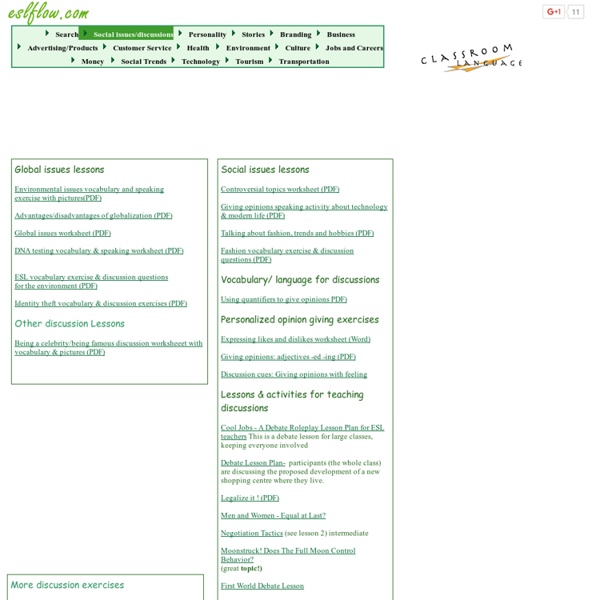



http://www.eslflow.com/debateanddiscussionlessons.html
Related: e-nglishStories About People (Biographies) in Easy-to-Understand English There are 265 fifteen-minute MP3 files and 11 shorter MP3 files. That is about 66 hours of listening. Activists & People Important to Social Reform Betty Friedan - Women's RightsCesar Chavez - Labor ActivistFrederick Douglass - African-Americans's RightsJane Jacobs - Activist, Writer, Moral Thinker And EconomistLabor Leaders: Samuel Gompers, John L. Lewis, Walter Reuther, A. Conversation Questions for the ESL/EFL Classroom If this is your first time here, then read the Teacher's Guide to Using These PagesIf you can think of a good question for any list, please send it to us. Home | Articles | Lessons | Techniques | Questions | Games | Jokes | Things for Teachers | Links | Activities for ESL Students Would you like to help? If you can think of a good question for any list, please send it to us.
Violence in the Media ESL Classroom Debate This debate can easily turn into a debate about what 'Free Speech' really means, and can therefore be extremely interesting to students who are living in countries where the right to 'Free Speech' is considered a fundamental right. You can choose groups based on the students' opinions. However, you can also have students support opinions that are not necessarily their own to help improve fluency. In this manner, students pragmatically focus on correct production skills in conversation rather than striving to "win" the argument. For more information on this approach please see the following feature: Teaching Conversational Skills: Tips and Strategies Aim: Improve conversational skills when supporting a point of view Activity: Debate about the question of whether violence in the media (Television, newspapers, magazines, internet, etc.) needs to be more tightly regulated.
The 10 Best Places to Find ELT Listening Materials – Teach them English This domain name may be for sale. Please click here to inquire. teachthemenglish.com UFO: A Story to Remember Students should visit a web site or read articles and come ready to discuss the questions in preparation for the listening activity during the next class. Use the site below or locate one through a search engine: The National UFO Reporting Center directed by Peter Davenport What are UFOs and what do they look like? What do the reported aliens look like? How do you explain the numerous sightings of these objects? A Midsummer Night’s Dream No Fear Shakespeare puts Shakespeare's language side-by-side with a facing-page translation into modern English—the kind of English people actually speak today. Table of Contents Characters Act 1 Act 1, Scene 1 Act 1, Scene 2
Placement test for learners of English Placement tests are very important for students of languages. First, they can serve as motivation because they show whether the students improved their knowledge. Second, they help students choose the correct course on their level. And last but not least they inform students how good their English is. However, good placement tests are very expensive and mostly printed. Wikijunior:Ancient Civilizations About the Wikijunior Ancient Civilizations[edit] The target age of this title is 8–12 years old. Section titles will include major groups of people or substantial empires in ancient times. The print version will focus only on answering a specific series of questions about selected civilizations. There will be an introduction and a basic discussion of archaeology.
Crazy Vocabulary - learn 11 new words in a rap Scientists claim that the center for rythm is located next to the long-term memory in our brain. Knowing this, we could exploit it to the students’ benefit and teach them vocabulary through rhymes or raps. So, I tried to create the following rap to teach the students the following words: beach, prefer, rhyme, crazy, bone, railway, clothes, lots, fun, sand and shower. Crazy Vocabulary Rap -video First listen to the following rap and answer the comprehension questions under the video. High School ESL: High School ESL Lesson Plan - Personality Test. This is a low level lesson I have designed around this fantastic Prezzie presentation by Harriet Smith. It is ready to go using just the Prezzie and some paper. Lesson aim.To learn words that can be used to describe personality.Time.50 minutes What you need.What Kind of Person are You?
Webquest: Thanksgiving: History and traditions By Gabrielle Jones This Thanksgiving webquest by Gabrielle Jones includes activities designed to inform students about the history of Thanksgiving, the traditions practised today, typical food associated with Thanksgiving and how other cultures celebrate harvest time. It is free to all onestopenglish users. The short history of global living conditions and why it matters that we know it - Our World In Data This is the introduction to Our World in Data – the web publication that shows how global living conditions are changing. This text was previously titled "A history of global living conditions in 5 charts". A recent survey asked “All things considered, do you think the world is getting better or worse, or neither getting better nor worse?”. In Sweden 10% thought things are getting better, in the US they were only 6%, and in Germany only 4%.